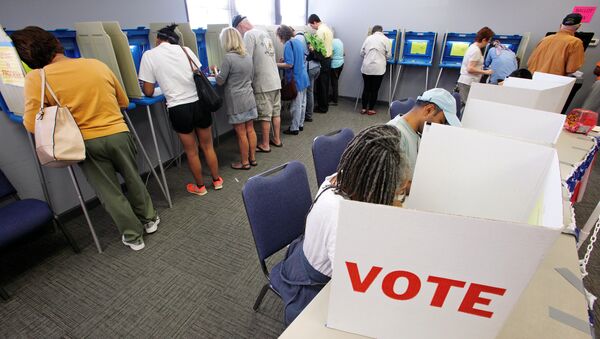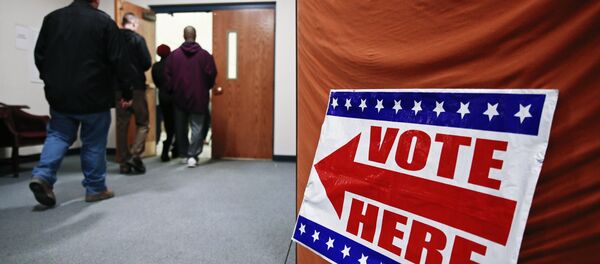On Friday, The Hill reported that the Georgia state government had purged 107,000 people from the state's voter rolls because they had not voted in previous elections. Under the state's "use it or lose it" law, at the end of a three-year process, Georgia voters are removed from lists enabling them to vote at designated voting locations on Election Day, which is the second Tuesday in November in the United States.
The report came only two days after a group of about 40 elderly, African-American residents of a senior living center in Louisville, Alabama, were forced to get off a bus that was transporting them to a voter registration site. The Atlanta Journal-Constitution reported that Jefferson County officials considered the event "political activity," which is banned during county-sponsored events.
"We knew it was an intimidation tactic," LaTosha Brown, a co-founder of Black Voters Matter, told the Atlanta paper. "It was really unnecessary. These are grown people."
And only days before that, Politico reported that the Georgia NAACP [National Association for the Advancement of Colored People] was preparing to sue Secretary of State Brian Kemp, who is also the Republican candidate for governor, for having put on hold 53,000 voter registration applications due to supposed inconsistencies in their details. Most of them belong to African-Americans.
Kemp's adversary in the race for Georgia's governorship is Democrat Stacey Abrams, who would become the state's first black female governor if elected. The extremely tight race could hinge on a relatively small number of votes, and Abrams has argued that Kemp's office has worked to suppress the votes of African-Americans in the state. Kemp maintains that he is preventing voter fraud, a common refrain in cases of voter registration purges and when rules regarding the voting process are tightened.
Radio Sputnik's Loud and Clear spoke with Jacqueline Luqman, the co-editor-in-chief of Luqman Nation, which hosts a livestream every Thursday night at 9:00 p.m. on Facebook, about the wave of voter suppression. She told the show it's nothing new, but rather a purposeful part of a conservative "long game" to "disenfranchise entire groups of people."
"Let's stop acting like these things are coincidences," Luqman told hosts John Kiriakou and Brian Becker. She noted that it's become common practice for voter drives at black social institutions like churches to be declared illegal in some fashion.
"This is not new," she said. "The issue with people like Brian Kemp, who implemented that voter roll purge eight months after he declared his candidacy," which Luqman made clear isn't in itself unusual and which states do regularly to keep up with changes in the voting population, "but this is wrong because these people were removed from the voter rolls simply because they hadn't voted before."
"There is no ‘use by' date on the right to vote," she said.
However, the US Supreme Court in June upheld Ohio's aggressive purging of voter rolls based on the failure to respond to a mail-in residency verification card sent out by the state. In an individual dissent against the 5-4 majority, Justice Sonia Sotomayor wrote that the program reflected "concerted state efforts to prevent minorities from voting and to undermine the efficacy of their votes" that were "an unfortunate feature of our country's history."
"So now we've got [voter suppression] that is coming to light that honestly, people have been talking about, people on the ground, grassroots activists, people have been talking about for years. And now you've got the voter suppression efforts that are new that are going on in North Dakota with the Native American population. This is the long game that these people have been playing for decades," Luqman said.
On October 13, NPR reported that a final decision by North Dakota's Supreme Court saw the legal review body fail to overturn a controversial voter ID law that requires residents to use a current street address in order to vote. Post Office boxes won't do.
The problem, however, is that tens of thousands of North Dakotans, and essentially all Native Americans living on reservations in the state, have lost their ability to vote. For Native American reservations, the move is permanent and complete: there are no street addresses on reservations, only PO boxes.
NPR noted that it's still possible to get around the residency requirement with "supplemental documentation." But, even then, about 18,000 people are left out in the rain.
"The timing is horrible," said Jamie Azure, the tribal chairman of the Turtle Mountain Band of Chippewa Indians, who told NPR that his tribe has been preparing for this shift ever since the law was first passed years ago.
The Standing Rock Sioux Tribe said it was sending drivers to take voters to the polls on November 6.
"Native Americans can live on the reservations without an address. They're living in accordance with the law and treaties, but now all of a sudden they can't vote," Standing Rock Chairman Mike Faith said in a statement shared on Facebook last Thursday.
"Our voices should be heard, and they should be heard fairly at the polls just like all other Americans," Faith said.
"Let's be clear here: the people who are doing this are not unaware of the implications. And this is where I think people make the mistake of thinking that these types of actions are not a big deal. People tend to believe, ‘Oh, well, these politicians didn't know what the outcome would be.' That's impossible," Luqman said, adding that "it's impossible that they did not know that these types of policies would disenfranchise entire groups of people. That's why they do them."




